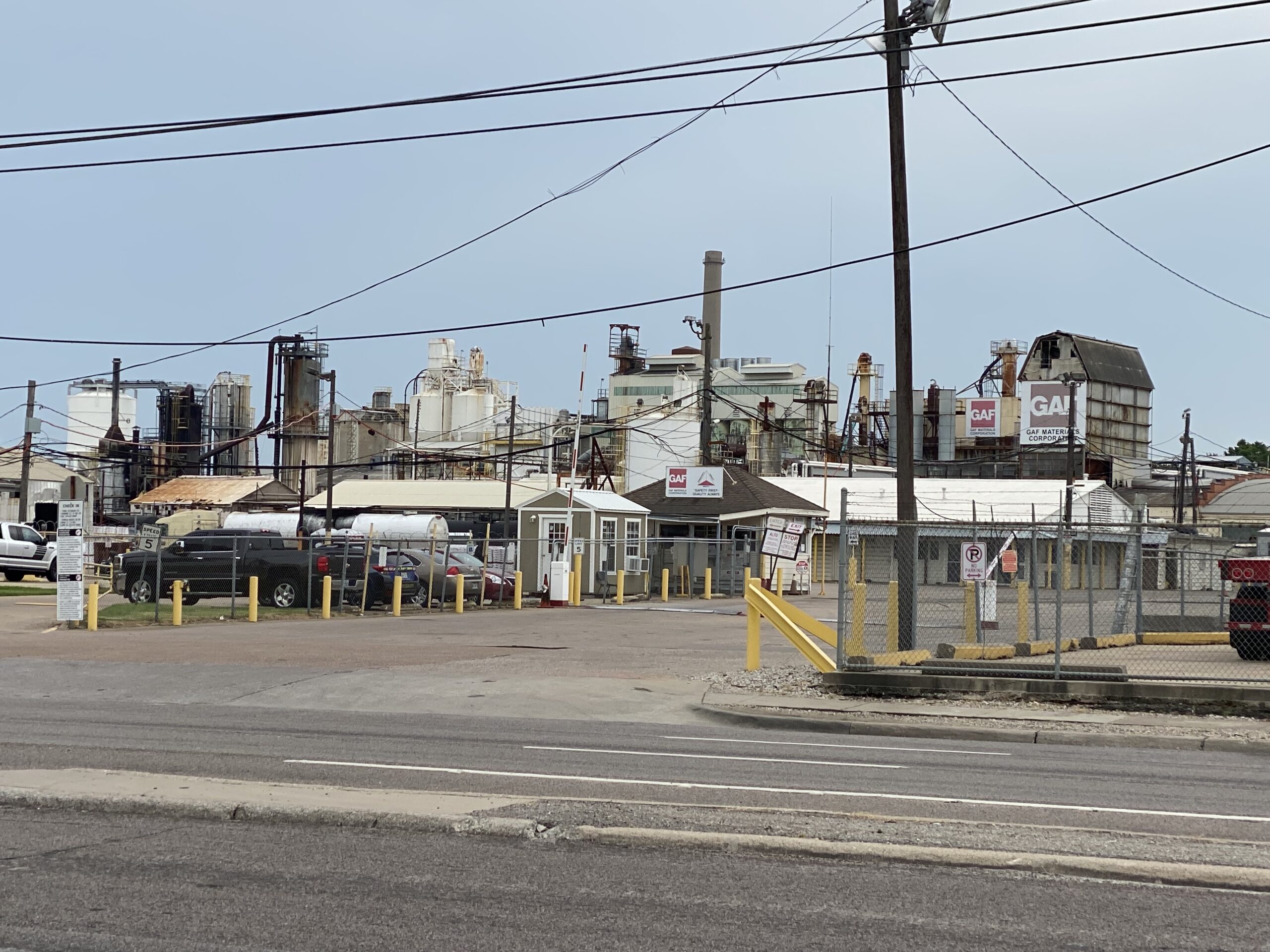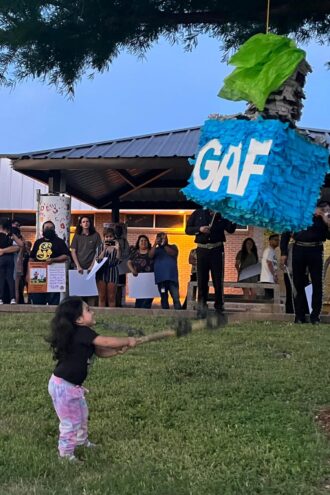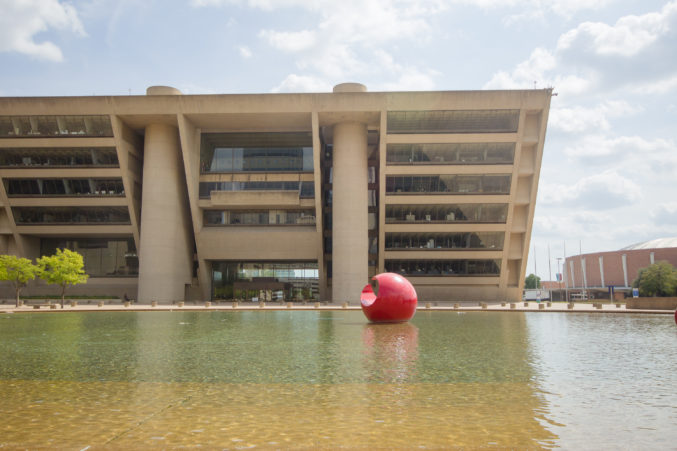A new state law requires cities to provide more notice and even pay business owners if a zoning change shuts them down. But one community says Dallas is going beyond the scope of that law as it works to amend city code in a way that may quash their efforts to remove a polluter from their neighborhood.
For more than two years, a group of West Dallas neighbors calling themselves Singleton United/Unidos have been working to remove the GAF shingle factory that has operated on Singleton Boulevard for more than 80 years. Group spokesperson Janie Ciseneros and others report increased health issues—especially respiratory ailments—because of the emissions from the plant. They want it gone, but say the city won’t allow them to use a process called amortization to force GAF to leave. The community also says it feels unsupported by their city councilman, Omar Narvaez.
“City government is abandoning us. Omar Narvaez is abandoning us. City Hall is making it impossible for Black and Brown residents in Dallas to get rid of hazardous polluters like GAF the way we got rid of RSR and the other lead smelters in the 70s and 80s,” Cisneros said in a press release Monday, referring to the plants that organizers successfully removed decades ago.
Amortization, the group explained, is the city’s provision for allowing neighborhoods to oust bad neighbors—specifically those who no longer fit with the composition of the neighborhood. GAF has been in the neighborhood since 1946, but since then, homes and schools have cropped up around it, and neighbors like Cisneros are tired of the emergency room visits, the shortened lifespans, and even just the smell.
The city says that it can’t take new amortization cases until it has time to change its development code to match a new law—Senate Bill 929—that directly impacts amortization and other zoning changes. During a Tuesday meeting of the Zoning Ordinance Advisory Committee, a group of appointed volunteers that vets changes to the zoning code, executive assistant city attorney Casey Burgess said staff was recommending amortization requests go through the City Council because “under the new system it’s really treated as eminent domain, not amortization.”
“Really only the City Council can authorize eminent domain,” he said.
During the Texas Legislature’s regular session, SB 929 was passed and signed into law. That bill requires cities to notify a property owner of any proposed zoning changes that could render their business a non-conforming use. If the owner is required to close because of the zoning change, they could be entitled to compensation for the cost of doing so.
The bill seems to have some of its genesis in Dallas. In the accompanying analysis of the bill, its sponsors seem to make two references to the city:
“One city put a number of auto-related businesses out of work to establish an ‘arts-gateway,’ and instead of offering compensation for lost revenue, the city sought $1,000 per day fines for those who continued to operate while fighting for their livelihoods. Another city passed new regulations on property leases that would force several landlords out of the rental business. In one case, a city threatened to drive a roofing materials factory that employs 150 workers from their property without giving them a dime even though they legally called the factory their home of 80 years. Facing certain abuse of the city’s amortization ordinance, the company relented and plans to shut down its plant in just seven years and vacate the property, likely carrying the expense of hundreds of millions of dollars. Often, businesses facing amortization close for good or move their factories and jobs out of Texas.”
The third example aligns closely with the state of affairs regarding the GAF shingle factory. The first hews closely to the story of Hinga Mbogo, who ran an auto repair shop on Ross Avenue and fought the city in its move to amortize it, appealing the case all the way to the Texas Supreme Court. The state’s high court declined to take up the case in 2019.
Mbogo was represented by lawyers at the Institute for Justice. The nonprofit firm said on its website that it intended to “take this fight to the Texas Legislature and urge it to ban this pernicious and cruel form of uncompensated taking of private property.”
GAF, for its part, says it didn’t ask for legislation. A spokesperson said the company “was not involved with, and did not advocate for or against any legislation related to the rights of municipalities.”

This latest round of confusion comes after almost two years of work by Singleton United to bring attention to their plight. In June 2022, Singleton United celebrated the completion of a report that made their case for amortization.
But GAF, through its Dallas representation Masterplan, announced in July 2022 that it planned to leave on its own accord. It promised to negotiate with neighbors to determine a timeline. But by September, GAF stopped negotiating and instead filed a zoning change request. The company detailed a plan to vacate by 2029, at which point the area currently zoned for industrial use would be changed to a planned development with a mixed-use designation that would allow retail, office space, hotels, or multifamily residential development.
Singleton United and West Dallas One, another community group, felt that 2029 was too long to wait. A year ago, when GAF filed to change the zoning on its eight contiguous parcels of land, Cisneros said she was skeptical of the company’s intentions.
“Negotiations never existed, and we feel that it was all just a ruse,” she said then. “Our concerns are that GAF may try to convince the city of Dallas to allow them to operate legally in our neighborhood, as a conforming use, through the zoning process.”
By late last year, Masterplan and GAF announced a slate of community meetings that would allow them to make their case. They held two. A website designed to give the community updates indicates additional meetings were planned, but dates for those meetings are still listed as to be determined.
The Dallas Free Press, a nonprofit news outlet that covers West Dallas and South Dallas, reported in May that public meetings were canceled “for the time being” but that the company did meet with several organizations, including West Dallas 1. West Dallas 1, in turn, held a series of public meetings to relay the information it learned. Free Press also reported that GAF had selected a site for its new plant and that it would begin producing shingles in 2027.
A company spokesperson said Wednesday the company still intends to leave West Dallas by July 2029.
Regardless of the company’s intent, Singleton United is tired of waiting. In a press release distributed earlier this week, the group said it has been trying to file paperwork to begin the amortization process in hopes that it will prove to be faster than GAF’s timeline.
Under the city’s current code, a resident can file to begin the amortization process on a property by paying $1,000. From there, the city’s Board of Adjustments would decide whether to take the case and be responsible for declaring the plant a “nonconforming use,” which would force it to leave. However, GAF could (and probably would) appeal such a decision, which means that the path to amortization might ultimately take as long as the company’s stated timeline, too.
But Singleton United’s efforts to kickstart the amortization process have hit a snag. The city will not accept the application because it is still making changes to its code to reflect SB 929. (KERA’s Nathan Collins followed Cisneros as she attempted to file the paperwork in multiple city departments.) At Tuesday’s ZOAC meeting, roughly 20 community members signed up to speak.

Chief among their complaints is a provision the city staff recommended that appears to eliminate the option for residents to start the amortization process on their own. The staff recommendation to require residents to submit a request to their city council member goes above and beyond what SB 929 requires.
As each community member made their pleas, it seemed that the ZOAC members heard them. The committee voted unanimously to table the matter until its meeting in November. Several members had requests for city staff to address the concerns of West Dallas residents.
“I would encourage staff to re-look at this and look at a process that is inclusive and not exclusive,” said committee member and City Plan Commissioner Lorie Blair.
Fellow commissioner and committee member Brent Rubin agreed, asking for “big language from the city attorney’s office that addresses the many valid concerns” from committee members and the community.
In the end, the city is required to make changes to its code to reflect the new state law. But it will ultimately be the City Council’s decision as to whether residents will be allowed to formally request the removal of businesses in their communities. Cisneros and her neighbors, once again, must wait.
Author






